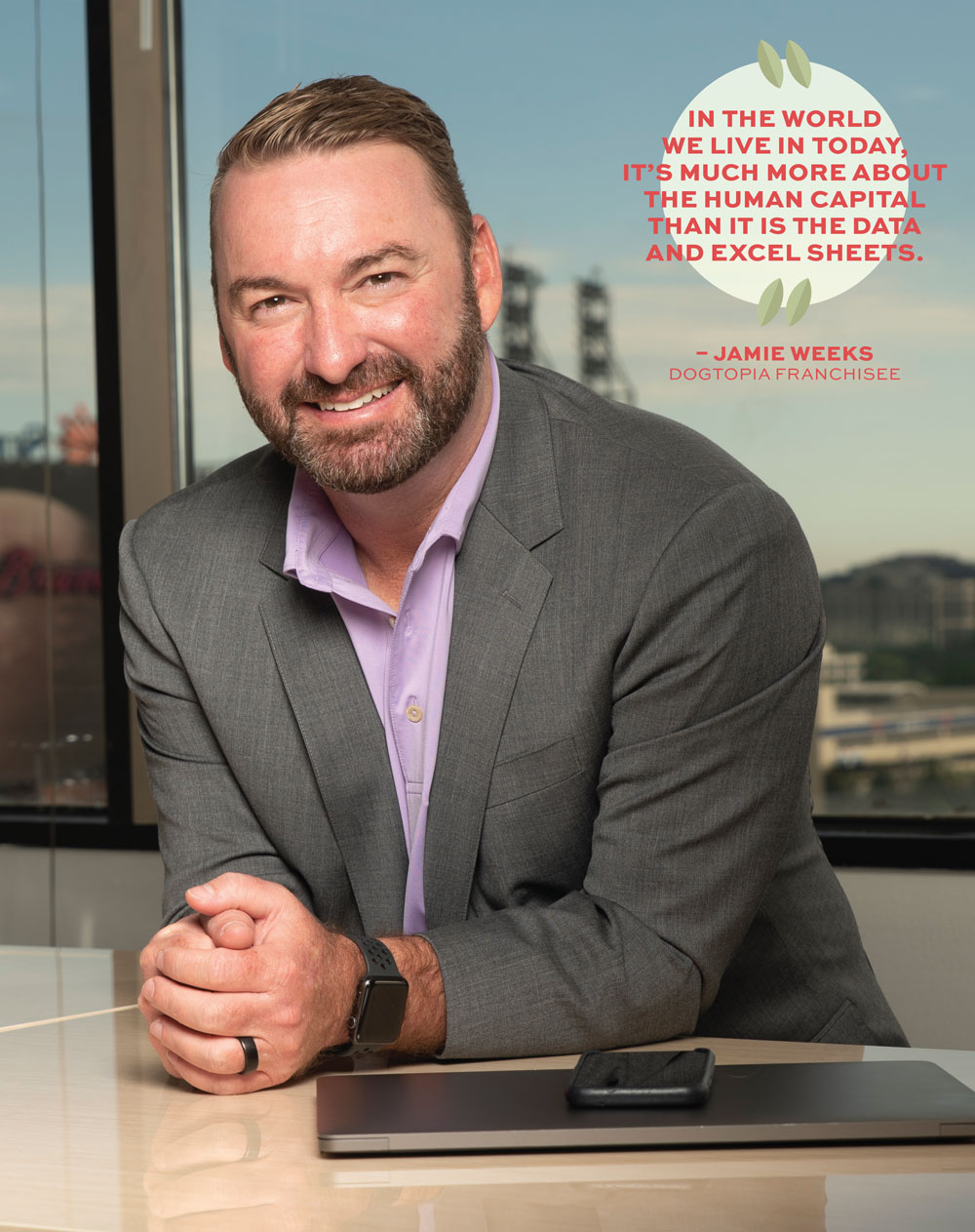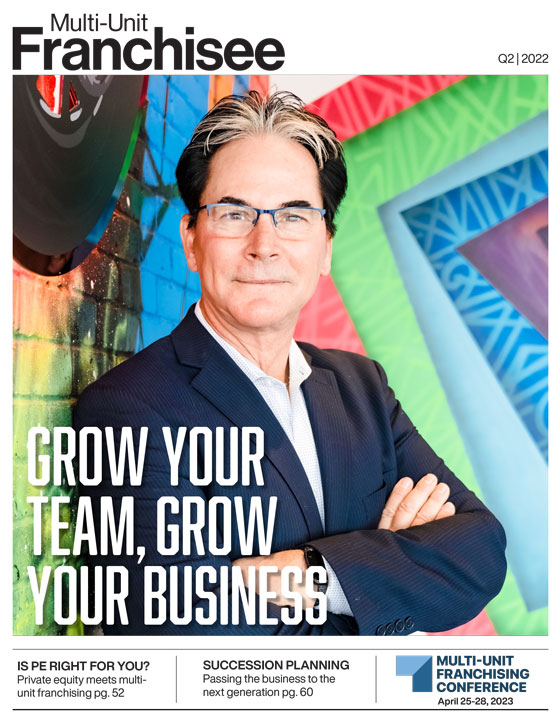Partners in PE? Private equity, meet multi-unit franchisees!

Private equity investors of all stripes continue to like what they see in franchising, more with each passing year. The search for opportunities to invest for a competitive return has accelerated a buying spree for stakes in multi-unit franchisee operations like never before.
“We’ve been blown away by the amount of opportunity we see in franchising,” says Michael Esposito, founder and co-managing partner of Franchise Equity Partners (FEP), which launched in 2021.
Private investors’ appetite for franchising’s scalable revenue stream has been gaining steam for more than a decade through outside capital investments in single brands. And more recently, in the growing numbers of large multi-brand franchisors such as Neighborly and Authority Brands in home services, and Inspire Brands, Focus Brands, and Yum Brands in restaurants.
Today, as tech-driven multi-unit franchisees emerge amid continued industry consolidation, private equity managers see similar synergies and high-return potential on the owner side of the business—and are striking deals with strong operators hungry to expand.
“I think private equity is taking notice and starting to do this on a smaller scale, with similar principles behind it: the ability to share resources, above-store leadership, digital development, and things of that nature and see that as an opportunity in a high-cash business,” says David Blackburn, CEO and COO of Southern Rock Restaurants.
As the largest franchisee of McAlister’s Deli, Blackburn has looked to private equity for funding. “Everybody has to eat three times a day. We like those odds, and if you can meet and exceed your guests’ expectations, then you have every chance in the world to continue to grow that business.”

What PE brings to the table
Private investors, who typically come to the table with deeper pockets and a higher risk tolerance than traditional lenders, can provide franchisees with a fast track to growth. Depending on the goals, operators look to use private equity’s influx of capital in various ways, including:
- expansion, the opportunity to scale more quickly;
- best practices and strategic transactions, such as an acquisition;
- resources to bolster infrastructure; and
- as an exit strategy.
The influence of outside equity on franchise operations often extends beyond just a cash infusion, adding value through financial expertise, bolstering vendor and supplier relationships, and improving training, support, and marketing through best practices. The move to implement higher-quality, centralized systems across a portfolio of multi-unit, multi-brand holdings has the potential to professionalize the future of franchising in transformative ways.
Brands such as Dogtopia are already reaping the rewards of private equity’s investment infusion with proven operators such as Jamie Weeks. Weeks, a Dogtopia franchisee in Portland, Oregon, recently became the largest area developer of the dog day care brand as part of his blossoming relationship with Prospect Hill Growth Partners, a Boston-area private equity firm.
In March 2022, in partnership with Weeks, Prospect Hill announced the formation of Legacy Franchise Concepts (LFC), described as a “multi-brand platform focused on high-growth, multi-site consumer services concepts.”
Weeks, who teamed up with Prospect Hill to become the largest franchisee of Orangetheory Fitness, spent 20 years on Wall Street. He knows what he likes—and doesn’t—in both private investors and franchisors, and what he needs to scale as a franchisee for the benefit of everyone with a vested interest.
“I think we are going to be able to do it the right way,” says Weeks, executive chairman of LFC. “We’re going be able to put in place the processes and the things that are going to make the business better and tighter, and the people who benefit are going to be the franchisees.”
Along with spearheading the operations and development of 72 Dogtopia day care locations, LFC operates the global rights to the wellness concept SweatHouz, with plans for more acquisitions in the health, wellness, and lifestyle sectors.
Weeks remains CEO of Honors Holdings, where he forged his relationship with Prospect Hill in 2017 as an investor in Orangetheory, expanding from 12 to 135 studios. He describes his partnership as being as close to 50/50 as you’re going to get.
“You don’t know who’s swimming naked until the tide goes out,” he says. “Going through a pandemic with them [Prospect Hill] proved to me that they’re the best friend I could have ever chosen. I’m not saying they’re the only firm, or that there aren’t other firms just like them. I’m just saying that you are defined by tough times, and to me, that’s most important.”
Challenges and opportunities
Establishing the parameters and roles before going into business “is the most important thing to do when entering into a relationship with a PE group,” says Luis Ibarguengoytia, president and CEO of Irving, Texas-based Chaac Foods, a division of Gauge Capital.
Ibarguengoytia, former COO of Sun Holdings, one of the largest U.S. multi-brand franchisees, is no stranger to smart, aggressive growth. His decision to partner with Gauge, the Southlake, Texas, middle-market PE firm in his own backyard, was “love at first sight,” he says.
“We spent 8 months putting our partnership together without an asset to buy. Our central focus was on the relationship and the partnership first, and we knew that the assets would come. I knew there was a lot of opportunity in the space. We just needed to go find it,” he says.
Since starting with a “small” acquisition of 32 Pizza Hut locations in Ohio in December 2019, Chaac Foods, named for the Mayan rain and thunder deity, has grown rapidly into a portfolio of 169 stores in 10 states covering 8 restaurant brands and a bustling development pipeline.
Partners for growth
When Esposito and co-founder and managing partner Scott Romanoff decided to form investing platform Franchise Equity Partners (FEP) after nearly 30 years at Goldman Sachs, they wanted to do something different. Backed by HPS Investment Partners, which has more than $80 billion of assets under management, they launched FEP to create a pool of capital that would be differentiated, unique, and attractive to franchisors and franchisees.
Based in New York, FEP, a portfolio company of investment funds managed by HPS, is bullishly ready to fill the void it sees in financial equity-based options for strong multi-unit franchisees. Their plan is to make $1 billion in “passive, permanent, minority equity investments” of up to 20 franchise businesses over the next 3 years.
“We think franchising is 10% of GDP,” says Esposito. “I can promise that not anywhere near 10% of institutionalized capital when it is allocated is going to franchising. We think it’s a big opportunity.” And their plan to hold minority, passive, and permanent positions in each brand is purposeful, with a particular emphasis on “permanent,” says Esposito.
“We do not consider ourselves private equity at the investment level. We have no ability to force an owner to sell the business,” says Esposito. “We are not in the business of flipping these things every 5 years. If the owner wants to sell the business in 5 years, that’s fine. Get us a good price, and we’ll be happy. But we will not be able to pull the trigger and force the sale of the company.”
FEP plans to partner with established operators in five investment areas: auto dealerships, restaurants, heavy equipment dealerships, beverage distributors, and consumer services such as health and beauty. Each vertical must have an experienced operating partner “embedded in the ecosystem” to help “drive business impact and meaningful value for the firm’s portfolio companies,” says Esposito.
Among the company’s early investments is a slice of one of the country’s largest Taco Bell franchisees, Pacific Bells, acquired by the private equity firm Orangewood Partners in November 2021. Under the deal, Pacific Bells’ founder and CEO Tom Cook and others on the management team retained a significant minority stake in the company and continue to operate the restaurants.
What to expect from PE
The private-equity funding world is vast and varied. Culture, concept, appetite for growth, and level of preferred outside involvement must line up with a firm’s expertise and strategic approach. The expectations of these investors may also be far different than what franchisees have dealt with before.
When you engage with the world of PE, your business will be evaluated on the potential return on capital measured against the potential ROI from an investment in any other industry or business—not just restaurants, “but any other investment that could yield the return sought by the investor group,” says Ibarguengoytia. “Restaurants do not have big margins, and the company has to be extremely efficient to stay competitive with all other options available to investors.”
“There are private equity firms that live by the data, live by Excel, and don’t really get into the weeds of the human capital side,” adds Weeks. “And then you have the private equity firms that are 50% data-driven, with the other 50% human capital. To me, those are the firms you want to choose to work with if you’re a founder, operator, or CEO. In the world we live in today, it’s much more about the human capital than it is the data and Excel sheets.”
Make yourself attractive to PE
Although a new franchise deal with a private equity stake seems to make the headlines every day, bringing on an investment partner is not for everyone for various reasons, starting with size.
“I think that it’s difficult for a mom-and-pop. And I don’t mean that in any bad way. It’s just that it’s going to take more than owning three or four stores or studios,” says Weeks. “You must have the ability to scale a model to 20, 40, 60, 80 stores and studios. And if you don’t have that, it’s going to be difficult. But if you do, and have the white space and the team in place, then I think there are opportunities for private equity firms to come into these brands and help a franchisee expand and get much bigger. It’s not going to stop anytime soon.”
Multi-unit franchisees that have been quick to adapt to meet the consumer’s changing needs with technology, delivery, and drive-thru efficiencies can more easily capture the attention of outside capital investors.
“Their investment in technology, whether it’s organic, whether it’s even through acquisition, that matters to us,” said Sam Banon, principal at Gauge Capital, on an episode of the Gauge Capital Podcast. “In a tight labor market with wage inflation, having more technology and being able to lean on automation helps us generate cash. So, we really are appreciative of the franchisors that are spending their cash on investing in technology.”
FEP looks to team up with “super strong operators” with 50 to 75 stores for the foreseeable future, says Esposito, adding that while they are “open for business” with anyone who fits their criteria, it still comes down to ethics and partnership.
“At the end of the day, these are incredible personal decisions on the part of the owner,” says Esposito. “From our standpoint, if we’re going to be a minority, if we are going passive, and we’re going to be permanent, we really want to partner with people we like and trust.”
Even if you’re not ready to dive into a partnership with private equity, relationships can be cultivated for the future. Blackburn advises his fellow franchisees to create a list of potential financial partners. Meet with lenders, make phone calls, and attend gatherings, such as Franchise Update Media’s Multi-Unit Franchising Conference, to build relationships and keep potential financial partners or investors updated on your company’s growth and development.
“As lenders watch you grow, at some point they’re going to be interested in investing in you; or they will give you advice on where to send you to someone who can,” says Blackburn. “I want everybody to be hungry for what I’m doing, so when the time comes they all know who I am and where we’ve been. I think that makes a difference.”
Share this Feature
Recommended Reading:
FRANCHISE TOPICS
- Multi-Unit Franchising
- Get Started in Franchising
- Franchise Growth
- Franchise Operations
- Open New Units
- Franchise Leadership
- Franchise Marketing
- Technology
- Franchise Law
- Franchise Awards
- Franchise Rankings
- Franchise Trends
- Franchise Development
- Featured Franchise Stories
FEATURED IN

Multi-Unit Franchisee Magazine: Issue 2, 2022

$300,000
$1,000,000





 The multi-unit franchise opportunities listed above are not related to or endorsed by Multi-Unit Franchisee or Franchise Update Media Group. We are not engaged in, supporting, or endorsing any specific franchise, business opportunity, company or individual. No statement in this site is to be construed as a recommendation. We encourage prospective franchise buyers to perform extensive due diligence when considering a franchise opportunity.
The multi-unit franchise opportunities listed above are not related to or endorsed by Multi-Unit Franchisee or Franchise Update Media Group. We are not engaged in, supporting, or endorsing any specific franchise, business opportunity, company or individual. No statement in this site is to be construed as a recommendation. We encourage prospective franchise buyers to perform extensive due diligence when considering a franchise opportunity.